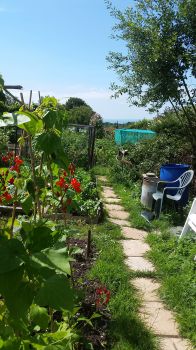Report urges shift to small-scale farming post-Brexit to halt wildlife decline & produce sustainable food
By: Stephanie Allen
Last updated: Thursday, 11 July 2019

Bringing people back onto the land and reorienting subsidies to small-scale sustainable farming after Brexit could help solve the current environmental crisis, according to a new report written by a University of Sussex professor.
The document, published as part of the Food Research Collaboration's (FRC) Food Brexit Briefing series, warns that radical changes in food production are urgently needed if we are to halt the decline of wildlife and provide people with ample, healthy and sustainable food.
Currently £3.5 billion per year in farm subsidies support industrial scale farming, with the most money going to the biggest landowners.
But Professor Dave Goulson, author of the FRC briefing, points out that allotments can produce abundant food whie supporting a healthy, biodiverse environment, showing that the two need not be mutually exclusive.
Professor Goulson said: "We are making such a mess of our planet; we're in the midst of a sixth mass extinction event.
"Leaving the Common Agricultural Policy could be a golden opportunity to revolutionise our farming system so it supports biodiversity and sustainable food for all.
"We will need to bring more people back onto the land as small-scale farming is more labour intensive, but would that be such a bad thing?"
Buying more land for allotments and getting more people involved in small-scale farming, primarily aimed at growing mixed fruit and vegetables for local consumption, would not only enable people to eat healthy food with minimal packaging, but it would also provide a route into employment in a time when more and more jobs are becoming redundant due to automation, argues the paper.
Professor Goulson, whose book The Garden Jungle or Gardening to Save the Planet is published today, calls for the removal of area-based subsidies and reinvesting the money in allotments, small-scale farms and research and development to optimise sustainability and productivity of this type of farming.
The paper also highlights that gardens and allotments are not only good models for sustainable food growing, but also spaces that allow average homeowners to contribute to wildlife conservation with simple actions such as not using pesticides; providing homes for bees and other insects; and growing plants that insects can pollinate.
Read the full briefing here: https://foodresearch.org.uk/publications/grow-it-yourself-sustainable-farming/